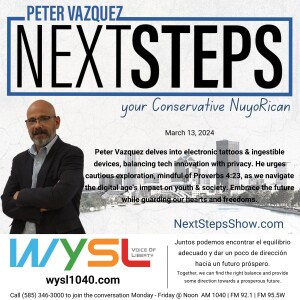
In a world increasingly captivated by the allure of technological advancement, the intersection of digital innovation and personal identity has given rise to a novel concept: electronic tattoos and ingestible devices. I am Peter Vazquez, your conservative NuyoRican host, delving into these cutting-edge developments with a discerning eye.
In this episode, we explore the implications of using electronic tattoos and ingestible devices for authentication—a remarkable fusion of biotechnology and digital security that adheres to the skin or is swallowed, serving as wearable or ingestible technology for secure identification and access control. This innovation boasts marrying convenience with security, heralding an era reminiscent of science fiction in our daily interactions.
Yet, as with any technological leap, significant considerations must be made. Scrutiny is imperative as we navigate through the implications on privacy, data security, and potential avenues for misuse. The adoption of such technologies, while still in their infancy, requires a cautious approach. The charm of convenience must not overshadow the paramount importance of safeguarding personal freedoms and privacy.
The appeal of electronic tattoos and ingestible devices extends beyond mere functionality, touching upon the realm of social and generational dynamics. The notion that children and teenagers might adopt these tattoos as a symbol of rebellion or expression paints a vivid picture of the generational divide in attitudes towards technology and privacy.
Despite the lack of specific statistics on youth adoption for rebellion, trends suggest a complex relationship between young individuals' engagement with digital technology and their awareness of privacy issues. This duality calls for a nuanced conversation about the implications of such technologies on privacy and autonomy, particularly among the younger demographic.
Another frontier in authentication technology is "Vitamin Auth," an ingestible device that transforms the human body into a living authentication tool. This innovation raises profound ethical and privacy concerns, as it blurs the boundaries between biological essence and technological identity.
The idea of one's body becoming a component of a digital system is as innovative as it is unsettling, emphasizing the need for a very large lens to scrutinize the ethical implications and safeguard individual rights and freedoms.
Framing authentication technologies as a form of "superpower" plays into the youth culture's fascination with superhero narratives, potentially enhancing their appeal. However, this marketing approach warrants a critical examination of the broader implications. Positioning such significant technologies as mere lifestyle accessories could dilute the serious considerations of privacy, consent, and autonomy. An approach that advocates for a balanced perspective, celebrating innovation while emphasizing the importance of responsibility, education, and understanding the potential long-term impacts on society and individual freedoms.
As we stand at the crossroads of technological innovation and personal identity, the conversation around electronic tattoos and ingestible authentication technologies is not merely about convenience and security. It's a profound dialogue about the future of our society, the sanctity of our personal freedoms, and the ethical boundaries of technological advancement.
As your host, I urge us all to approach these developments with both openness and caution, ensuring that as we embrace the future, we do not lose sight of the values that define us.
#NextStepsShow #PuttingPeopleFirst #ConservativeNuyoRican #CommunityTalk
No comments yet. Be the first to say something!